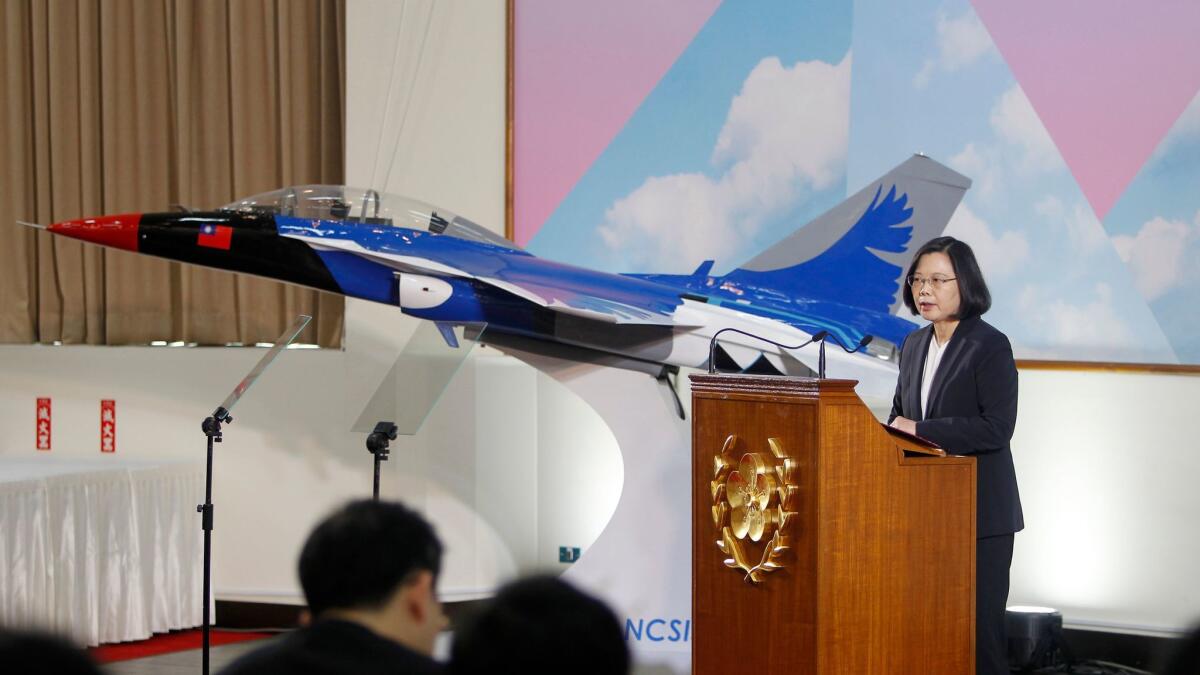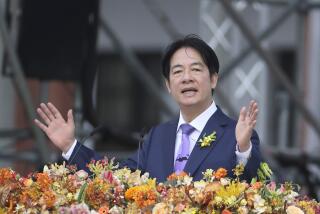Taiwan to bolster defenses as Chinese fighters and bombers pass offshore

Reporting from TAIPEI, Taiwan — Taiwan President Tsai Ing-wen said Friday she would raise the defense budget and develop more domestically manufactured weapons as its powerful political rival China steps up military test flights just offshore.
The island will increase defense spending with a focus on building military hardware such as a multifunctional drone, Tsai told a news conference at a defense research center near the capital, Taipei.
“Taiwan may not be big, but we are very determined to defend our country,” Tsai said. “Here, I solemnly pledge that we will continue to increase our defense budget on a stable and reasonable basis each year.”
Six Chinese bombers or fighters flew through the Miyako Strait north of Taiwan or the Luzon Strait to the south in July, November and again this month, according to the Taiwanese defense ministry.
“China’s intention to expand its military presence in the region has become increasingly evident,” the president said Friday.
China and Taiwan, which sit 99 miles from each other across the Taiwan Strait, have been separately ruled since the Chinese civil war, when Chiang Kai-shek’s Nationalists fled the mainland and set up their government in Taipei. China insists on eventual reunification — which most Taiwanese oppose, according to public opinion surveys — and has not ruled out use of force if needed to get there.
Tsai, a 61-year-old legal scholar who took office in May 2016 for a four-year term, has frustrated Beijing by rejecting its idea that both sides belong to “one China.” China wants Taiwan to agree to that as a condition for formal dialogue.
A national security official from Taipei said in October the island’s military budget would probably go up 2% a year. That would take it to about $10.7 billion in 2018.
Tsai’s government is stepping up development of its own weapons in part to avoid dependence on its traditional supplier, the United States.
Taiwan is worried that its arms supplies could be curtailed if the U.S. caves to pressure from Beijing, which fumes whenever Washington approves an arms sale to Taiwan, most recently a $1.42-billion package in June. This month, China’s minister to its embassy in the United States said any American naval visit to Taiwan would prompt a military response from Beijing.
The National Chung-Shan Institute of Science and Technology, where Tsai spoke, has developed missile and radar systems over its five decades. The defense ministry chose it this year to develop trainer jets. In early 2016, the ministry contracted with Taiwanese manufacturers to develop a $3.3-billion submarine within eight years.
A domestically built drone with surveillance capabilities is “about to begin mass production,” Tsai said Friday.
Over the past two years, Chinese military units have sent planes 10 times to just outside the Taiwanese air defense zone, according to Andrew Yang, a former defense minister of Taiwan and secretary-general of the Chinese Council of Advanced Policy Studies, a Taipei-based think tank focusing on military affairs.
China’s military aircraft are “collecting information” and testing Taiwan’s resolve to defend itself, said Shane Lee, a political scientist at Chang Jung Christian University in Taiwan.
Tsai has called the flights a “conflict” with regional stability.
She said Friday that the Chinese maneuvers threaten East Asia as a whole and that affected countries “with similar ideas” should increase communication. Japan, an informal ally of Taiwan, has raised its alert over the Chinese plane movement as its own outlying islands lie near the Miyako Strait.
Last week Tsai asked the air force command center to step up monitoring for any more planes. But she said Friday that she believes China’s leader to be a “reasonable” decision maker, and that Taiwan has no plans to start a fight.
“I want my countrypeople to rest assured that cross-strait relations will not be reckless,” Tsai said. “They will not be deadlocked.”
Taiwan can ultimately do little to resist China’s aircraft movement, said Liu Yi-jiun, a professor of public affairs at Fo Guang University in Taiwan. The military is “capable of doing some [moves] for show, but they are not capable of carrying some serious missiles,” he said.
China has also expressed its discontent with the Tsai government by scaling back its tourism to Taiwan, analysts believe. They say China had a strong hand in the recent decisions by two countries, Panama and the west African nation Sao Tome and Principe, to switch their diplomatic recognitions from Taipei to Beijing.
More to Read
Sign up for Essential California
The most important California stories and recommendations in your inbox every morning.
You may occasionally receive promotional content from the Los Angeles Times.










